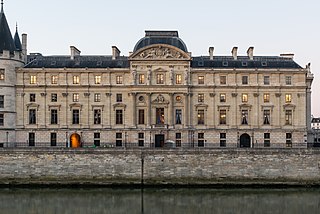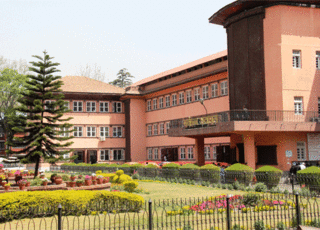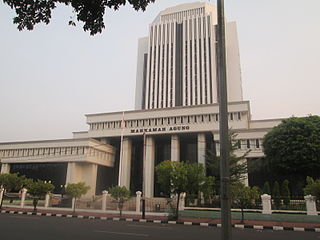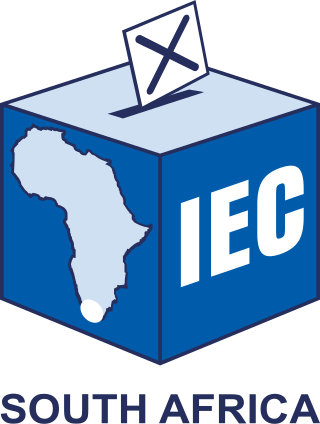
Whilst the House of Lords of the United Kingdom is the upper chamber of Parliament and has government ministers, for many centuries it had a judicial function. It functioned as a court of first instance for the trials of peers and for impeachments, and as a court of last resort in the United Kingdom and prior, the Kingdom of Great Britain and the Kingdom of England.

The Court of Cassation is the supreme court for civil and criminal cases in France. It is one of the country's four apex courts, along with the Council of State, the Constitutional Council and the Jurisdictional Disputes Tribunal.

The vice president of India is the deputy to the head of state of the Republic of India, i.e. the president of India. The office of vice president is the second-highest constitutional office after the president and ranks second in the order of precedence and first in the line of succession to the presidency. The vice president is also the ex officio chairman of the Rajya Sabha.

The Constitutional Court of South Africa is a supreme constitutional court established by the Constitution of South Africa, and is the apex court in the South African judicial system, with general jurisdiction.

The courts of Scotland are responsible for administration of justice in Scotland, under statutory, common law and equitable provisions within Scots law. The courts are presided over by the judiciary of Scotland, who are the various judicial office holders responsible for issuing judgments, ensuring fair trials, and deciding on sentencing. The Court of Session is the supreme civil court of Scotland, subject to appeals to the Supreme Court of the United Kingdom, and the High Court of Justiciary is the supreme criminal court, which is only subject to the authority of the Supreme Court of the United Kingdom on devolution issues and human rights compatibility issues.

Under the Constitution of Finland, everyone is entitled to have their case heard by a court or an authority appropriately and without undue delay. This is achieved through the judicial system of Finland.

The Supreme Court of Nepal is the highest court in Nepal. It is designated as the court of record by the Constitution of Nepal. It has appellate jurisdiction over decisions of the seven High Courts and extraordinary original jurisdiction. The court consists of twenty judges and a Chief Justice.

In most legal jurisdictions, a supreme court, also known as a court of last resort, apex court, and highcourt of appeal, is the highest court within the hierarchy of courts. Broadly speaking, the decisions of a supreme court are binding on all other courts in a nation and are not subject to further review by any other court. Supreme courts typically function primarily as appellate courts, hearing appeals from decisions of lower trial courts, or from intermediate-level appellate courts. A Supreme Court can also, in certain circumstances, act as a court of original jurisdiction, however, this is typically limited to constitutional law.

The Supreme Court of the Russian Federation is a court within the judiciary of Russia and the court of last resort in Russian administrative law, civil law and criminal law cases. It also supervises the work of lower courts. Its predecessor is the Supreme Court of the Soviet Union.

The Queensland Court of Disputed Returns is a court that adjudicates disputes concerning Queensland Government and local government elections and state referendums in Queensland, Australia. The Court is a division of the Supreme Court of Queensland.

The courts of South Africa are the civil and criminal courts responsible for the administration of justice in South Africa. They apply the law of South Africa and are established under the Constitution of South Africa or under Acts of the Parliament of South Africa.

The Judiciary of Indonesia constitutionally consists of the Supreme Court of Indonesia, the Constitutional Court of Indonesia, and the lesser court system under the Supreme Court. These lesser courts are categorically subdivided into the public courts, religious courts, state administrative courts, and military courts.

The Supreme Court of Mississippi is the highest court in the state of Mississippi. It was established in 1818 per the terms of the first constitution of the state and was known as the High Court of Errors and Appeals from 1832 to 1869. The court is an appellate court. The court consists of nine justices elected in nonpartisan contests from three districts to serve eight-year terms. The most senior justice serves as the chief justice. It is housed in the Carroll Gartin Justice Building in Jackson, Mississippi, the state capital.

The Electoral Commission of South Africa is South Africa's election management body, an independent organisation established under chapter nine of the Constitution. It conducts elections to the National Assembly, provincial legislatures and municipal councils.

The basis of the Bahamian Law and legal system lies within the English Common Law tradition. Justices of the Supreme Court, Registrars and Magistrates are all appointed by The Governor-General acting on the advice of the Judicial and Legal Service Commission, which is composed of five individuals who are headed by the Chief Justice as their chairman. The Chief Justice and the Justices of the Court of Appeal, including the President, are appointed by the Governor-General on the recommendation of the Prime Minister after consultation with the Leader of the Opposition. Once appointed, the salaries and other terms of appointment of the Chief Justice, Justices of Appeal and Justices of the Supreme Court cannot be altered to their disadvantage. Justices of the Supreme Court can serve until the age of 65 years and, where agreed among the judge, the Prime Minister and the Leader of the Opposition, may serve until the age of 67. Justices of Appeal can serve until the age of 68 years and, where agreed among the judge, the Prime Minister and the Leader of the Opposition, may serve until the age of 70 years. The law of The Bahamas makes provisions for the appointment of 12 Justices to the Bench of the Supreme Court, inclusive of the Chief Justice, and for five Justices of the Court of Appeal, inclusive of the President. The Chief Justice, as Head of the Judiciary, is an ex officio member of the Court of Appeal, but only sits at the invitation of the President.

The judiciary of Namibia consists of a three-tiered set of courts, the Lower, High and Supreme Courts. Parallel to this structure there are traditional courts dealing with minor matters and applying customary law.

The Supreme Court of Kenya is the highest court in Kenya. It is established under Article 163 of the Kenyan Constitution. As the highest court in the nation, its decisions are binding and set precedent on all other courts in the country.

The Judiciary of Kenya is the system of courts that interprets and applies the law in Kenya. After the promulgation of the Constitution of Kenya in 2010, the general public, through parliament, sought to reform the judiciary. Parliament passed the Magistrates and Judges Vetting Act of 2011. A major part of reforming the judiciary was the vetting of Magistrates and Judges in an attempt to weed out unsuitable ones. The Judicature Act has also been amended to raise the minimum number of Magistrates and Judges allowing more judicial officers to be hired. More magistrates and judges are needed to clear the backlog of cases that have caused great delay in the conclusion of cases and to staff new courts. New courts are needed to bring the courts closer to the people which is in line with devolution, a major principle written into the Constitution of 2010. New courts like the High Court opened in Garissa in November 2014 is a good example. In the past residents of North Eastern Kenya had to go all the way to Embu to access a High Court.
The South Australian Employment Tribunal, which also sits as the South Australian Employment Court is a South Australian tribunal empowered to adjudicate on rights and liabilities arising out of employment. It has existed in some form or another since 1912, under various names.
Owen Lloyd Rogers is a South African judge of the Constitutional Court of South Africa. Before his appointment to that court in August 2022, he served in the Western Cape Division of the High Court for nine years, having joined the bench in February 2013. Formerly an advocate and senior counsel at the Cape Bar, he was also a judge of the Competition Appeal Court between 2016 and 2022.

















